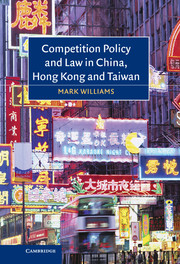Book contents
- Frontmatter
- Contents
- Preface
- Acknowledgements
- List of abbreviations
- 1 Introduction and methodology
- 2 Competition theory and the experience of states adopting competition law
- 3 The international perspective
- 4 China and economic regulation – history, politics and economics
- 5 Existing and proposed Chinese competition provisions
- 6 Competitive Hong Kong? myths, perception and reality
- 7 Implementation of competition policy in Hong Kong 1997–2004: economising with the truth
- 8 Electricity, telecommunication and broadcasting: competition regulation Hong Kong style
- 9 Taiwan - the third China
- 10 Political economy: an explanation of competition policy in Greater China
- 11 Competition policy and law in Greater China: where next?
- Bibliography
- Index
3 - The international perspective
Published online by Cambridge University Press: 28 July 2009
- Frontmatter
- Contents
- Preface
- Acknowledgements
- List of abbreviations
- 1 Introduction and methodology
- 2 Competition theory and the experience of states adopting competition law
- 3 The international perspective
- 4 China and economic regulation – history, politics and economics
- 5 Existing and proposed Chinese competition provisions
- 6 Competitive Hong Kong? myths, perception and reality
- 7 Implementation of competition policy in Hong Kong 1997–2004: economising with the truth
- 8 Electricity, telecommunication and broadcasting: competition regulation Hong Kong style
- 9 Taiwan - the third China
- 10 Political economy: an explanation of competition policy in Greater China
- 11 Competition policy and law in Greater China: where next?
- Bibliography
- Index
Summary
Introduction
This chapter will seek to trace, in outline, the influence of the international organisations on promoting interest in, and adherence to, comprehensive competition policy and the adoption of competition law in countries worldwide. In addition to mere promotion, some states, via international organisations, advocate that standardised competition provisions ought to be incorporated into public international law, so that signatory states to an international treaty would be obliged to enact compatible and effective laws domestically. Some have even advocated that such an international commitment should be enforceable via the Dispute Mechanism of the WTO. Indeed, the greatest progress in this regard has been made since the 1995 establishment of the WTO. However, there is no consensus, as yet, that those formal negotiations will in fact actually take place. Indeed, the likelihood of a consensus on the start of formal discussions on the issue now seems remote following the collapse of the ministerial meeting of the WTO in Cancun in September 2003 and the subsequent decision of the principal proponent of negotiations, the EU, to de-link this subject from other trade issues to be discussed as part of the proposed new round of multilateral trade negotiations.
Despite the lack of internationally agreed standards, much progress has been made worldwide in enacting competition statutes. International organisations have been very active in promoting competition policy and law, as well as providing technical assistance to facilitate adoption. On occasion the implementation of modern competition policy and law has been a condition of assistance to sovereign states that have found themselves in financial crisis
- Type
- Chapter
- Information
- Publisher: Cambridge University PressPrint publication year: 2005

